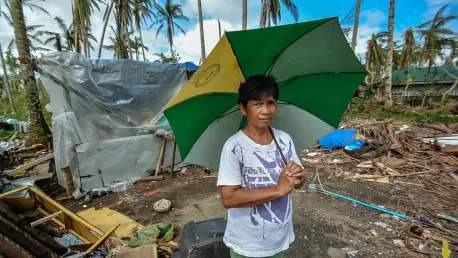What happens when a small business, battered by a hurricane’s wrath, reaches out to its insurer for a lifeline, only to be met with rejection? In the heart of North Carolina, East Fork Pottery faces this harsh reality after Hurricane Helene tore through Asheville, leaving devastation in its wake. This isn’t just a story of one company’s struggle; it’s a glimpse into the high-stakes world of insurance disputes where fine print can shatter dreams of recovery. Dive into the unfolding legal clash between East Fork Pottery and Travelers, a battle that could reshape how businesses weather natural disasters.
Why This Fight Resonates Far Beyond Asheville
The significance of East Fork Pottery’s lawsuit against Travelers, filed in federal court on August 5, stretches well beyond the rolling hills of Buncombe County. For small businesses across the nation, insurance often stands as the sole barrier between survival and collapse after catastrophic events. With natural disasters growing fiercer—evidenced by Hurricane Helene’s destructive path on September 27, 2024—this case spotlights a critical issue: the dependability of business interruption coverage when it’s needed most.
This dispute taps into a broader anxiety among entrepreneurs who fear that policies, marketed as safety nets, might unravel under pressure. As climate-driven events intensify, with federal data showing a 40% rise in billion-dollar disasters over the last decade, the outcome of this legal fight could set a precedent for how insurers handle claims in crisis. It’s a stark reminder that behind every policy lies a real business with real stakes, hanging on the edge of recovery or ruin.
The Storm That Started It All
Hurricane Helene didn’t just bring wind and rain; it unleashed chaos on East Fork Pottery’s operations. High winds toppled thousands of trees near their properties, while government-issued travel bans and road closures severed access to their locations. The result was a grinding halt to business, with financial losses piling up as swiftly as the debris left by the storm.
The pottery company, rooted in Asheville’s creative community, found itself grappling with more than physical damage. The operational shutdown triggered by these external barriers became the crux of their claim under a Deluxe Property Insurance Policy with Travelers. They believed coverage for business income, extra expenses, and disruptions due to civil authority orders would shield them—but the insurer had other ideas, setting the stage for a bitter conflict.
Dissecting the Denial: What Went Wrong?
At the heart of the lawsuit lies a tangled web of policy interpretation and alleged missteps. East Fork Pottery contends that their insurance explicitly covered losses from events like Hurricane Helene, including a civil authority clause meant to protect against government restrictions. Yet, on December 27, 2024, Travelers denied the claim, reportedly twisting policy language to justify the refusal while sidestepping clauses that favored coverage.
A particularly contentious issue emerged around a statement Travelers attributed to Jenny Hassler, East Fork’s Director of Finance, claiming the business stopped due to off-premises utility damage. The company staunchly denies this, calling it a fabrication used to bolster the denial. With damages sought at approximately $1,125,000, plus interest, and a push for treble damages under North Carolina law, the financial and legal stakes couldn’t be higher for this small business fighting to reclaim its footing.
Voices From the Frontline of the Dispute
East Fork Pottery isn’t waging this battle in isolation. Their insurance broker, Sam Stickney of Insurance Services of Asheville, stepped in to contest Travelers’ decision, advocating for coverage under the civil authority provision. Legal arguments, detailed in a letter from East Fork’s counsel on April 28, reference key precedents like the North Carolina Supreme Court’s ruling in North State Deli, LLC v. Cincinnati Ins. Co., which upheld similar claims, strengthening their position.
Despite these efforts, silence from Travelers has only deepened the frustration. Unanswered appeals and ignored communications paint a picture of a company left in limbo, desperate for resolution. While the insurer’s side remains unheard in court, the mounting evidence and legal citations from East Fork suggest a case built on determination, though the final judgment will rest with the judiciary’s interpretation.
Lessons for Businesses Facing the Unknown
For other small enterprises observing this unfolding drama, East Fork’s ordeal offers critical takeaways to navigate the murky waters of insurance claims. First, a deep dive into policy details before disaster strikes is essential—understanding terms like business interruption or extra expense coverage can prevent painful surprises. Too often, businesses learn the hard way that vague clauses can be weaponized against them.
Documentation also proves invaluable; meticulous records of damages, disruptions, and insurer interactions can fortify a claim, as seen in East Fork’s challenge to disputed statements. Engaging experts—whether brokers or legal counsel—early in the process adds another layer of defense, while persistence in appealing denials, backed by state laws like North Carolina’s provision for treble damages, can keep hope alive. These steps, though not foolproof, arm businesses with tools to demand the protection they’ve paid for when nature turns against them.
Reflecting on a Struggle for Justice
Looking back, East Fork Pottery’s clash with Travelers encapsulates the raw tension between small businesses and the insurance giants meant to safeguard them. Each unanswered appeal and disputed claim reflects a deeper uncertainty that lingers after Hurricane Helene’s winds have faded. The courtroom has become more than a battleground for damages; it stands as a test of whether policy promises hold weight when disaster strikes.
As this case moves forward, it urges businesses everywhere to scrutinize their own coverage with a critical eye, preparing for battles that might await after the next storm. It also sparks a call for clearer industry standards, pushing insurers toward greater transparency in how claims are handled. For those watching, the hope remains that future disputes will lean on lessons from this fight, ensuring that recovery, not rejection, defines the aftermath of nature’s fury.









